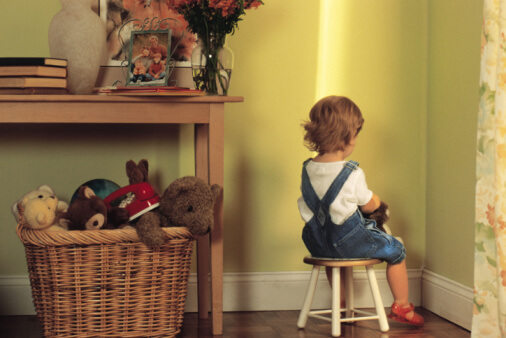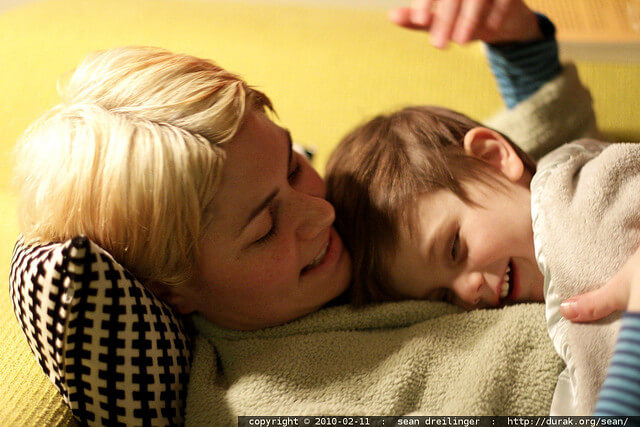The Easy Way to Help Difficult Children

The so-called “difficult children” are often judged, labeled and poorly understood. Isn’t that true? And yet these are the very children that need our help perhaps more than others.
It’s certainly true that this is a very difficult scenario to deal with, but today we aim to help you with that.
We’re going to give you some advice on how to help these very needy children. Don’t worry! It’ll be quite straightforward! You just need to give us a little of your attention, that’s all!
Trapped with no way out… that’s how these children feel. They feel closed in their own little world, trapped inside a shell that doesn’t let them express their fears.
Airtight, no doors, no windows, not even the slightest crack. That’s why it’s up to us to patiently find the way to set these little ones free.
How to help difficult children
First of all, if you want to help a difficult child, you must spend quality time with them, mixed with a good dose of patience. Maybe you already know this, but it never hurts to give a little reminder.
What is very clear is that all our efforts will be well worth it. All the attention we give to the child will bring positive results, and will mold them into better human beings in the future.
Both fathers and mothers are often overwhelmed by the circumstances, and view the mission of raising children as some sort of challenge.
However, if we view it in this way, we indirectly ascribe a negative burden to raising our child, and that will make the work far more difficult and burdensome.
On the other hand, if we change our way of thinking and approach it in a more positive way, then the road will become a far easier one.
Parents are often frustrated by the uncertainty caused by not knowing how to act correctly. Up until now, nothing they’ve tried seems to be working. But let’s try and keep calm, because cures aren’t always immediate.
The restlessness that the world generates in a difficult child is usually expressed incorrectly. Tantrums, tantrums and tantrums accompanied by crying, insults and disobedience. The young child is simply unburdening himself as best he can.
Dealing with emotions
The so-called “difficult children” are those who haven’t learned how to deal properly with their emotions yet. Because of this, their behavior towards others seems unacceptable.
All they’re trying to do, however, is defend themselves against the world. A difficult child can often perceive the world in such a hostile way that the only way he can react is defensively. It’s the only way he knows.
To help a difficult child you don’t have to make your life overly complicated. In fact, what we’re going to explain to you will actually make your life a whole lot easier.

Everyone is different, unique and unrepeatable. Because of this, any old advice that we may hear won’t necessarily be the right advice.
In spite of the good intentions that people may have when sharing their advice, it’s best to always consult a specialist and consider professional recommendations.
Why? Because, in this way, from very early on, you’ll avoid using a formula that may have worked for another child at a certain point in their life, but won’t be of any use for your child. At least not at the moment. Maybe later. The specialist will tell you when and how to proceed.
Our first piece of advice is very simple: stop saying that you have a problematic or difficult child. Yes, you read it right. And here comes another revelation: difficult children DO NOT exist.
No problem!
The words we choose to use, albeit subconsciously, define how people grow emotionally. The word “problem” doesn’t sound attractive, pleasant or good in any way.
If you decide to use another word, it will be far more beneficial. For example, the word “situation” simply implies a set of elements within some particular circumstances. A transitory question. Just one more stage.
The main thing is to focus on maintaining a positive outlook. Always look for the solution instead of simply studying the “problem.” We must move forward in all the situations that arise, because, quite simply: you only live once.
Addressing the issue as simply one more stage benefits us instantaneously.
We immediately feel that we’re just passing through a particular situation, in which we simply need to look for some sort of tool to be able to move forward. Doesn’t that sound better?
A problem, on the other hand, sounds like we have to stop because there is something wrong. This “bad” thing unleashes negative feelings and emotions: fear, anxiety, stress, sadness, among others. Not good!

A positive attitude frees us from feeling or accumulating stress and frustration.
Secondly, our advice to you is that you should be patient with yourself. As a mother, you must also look after yourself, so that you, in turn, can be your child’s “lifesaver” as they go through this stage of their life.
When you’re with the specialist, you should explain to him how you’re feeling, what you’re thinking, and anything else you want to tell him, in order for you to be able to maintain a healthy emotional life.
There is something you should always know: every child needs patience, love and understanding. But, if you don’t know how to love and understand yourself, and if you aren’t patient with yourself, then you won’t be able to offer these qualities to your little one.
Understanding his or her emotions is the key to success. It doesn’t have to be complex. Most likely, the child will resist at first, until he realizes he can let his guard down and that nobody and nothing is going to hurt him.
The secret is to establish solid links based on constant communication and unconditional affection. Under no circumstance should you let him isolate himself.
Don’t neglect your child, he needs you more than anyone else. If you take care of your child, and show him unconditional support, you’ll realize that his love will become bigger and he’ll reward you three times over.
But be careful! This reward is not the reason to help him. Your aim should be simply to see him happy and healthy.
The winding road
Without a doubt, you’ll walk along a winding road. For this reason you must always transmit protection and safety, so that your child will feel comfortable when expressing his repressed emotions.
Only in this way will he be able to get to know himself, and be able to unburden himself with absolute freedom and in an appropriate way.
Also, avoid looking for a scapegoat. Here there are no guilty parties. Difficult children aren’t necessarily the product of bad parenting.
If they need extra attention, understanding and support, then give it to them. If not, they will feel overwhelmed because they just won’t know how to avoid behaving in a “bad” way.
Helping a difficult child means, above all, finding the most creative strategies to meet their needs. The central point is nothing more than helping him manage that emotional tsunami that is overwhelming him.
For this reason, Emotional Intelligence is offered as a resource to channel and externalize feelings:
- It works towards a positive reinforcement, and has great power to help a difficult child. Don’t focus on the mistakes, because that will just increase the child’s anger and anguish. Express confidence in him, transmitting security. Say positive words to him when he does things well.
- It encourages communication without prejudice, comparisons or labels. Avoid prolonged interrogations. You just need to find the right moment to chat to him with affection and empathy. Communicate with a friendly tone, calm, sincere and with a quiet voice. Don’t ever mock or humiliate them, neither should you use irony.
- It sets out to achieve an internal balance in the child. Get the child to transmit their emotion in just one word. They should try to share what they are feeling in the right way, in order to bring them relief. Let them vent their feelings and in a controlled way, with the certainty that you’ll always be willing to listen to them and advise them.
- It teaches them relaxation, absolutely vital if we want to help a difficult child. Teach him to breathe deeply, and to channel his feelings through different methods and techniques to vent his feelings properly and get his mind off the problems. Teach him to listen and tolerate the frustration he is feeling.
By following these steps you should find that you’ll soon be making progress, and that your child will soon be dealing with their emotions in a much more controlled and positive way.
All cited sources were thoroughly reviewed by our team to ensure their quality, reliability, currency, and validity. The bibliography of this article was considered reliable and of academic or scientific accuracy.
- Galino, M. A. (1948). Los niños difíciles. Revista Española de Pedagogía, 133-157. https://www.jstor.org/stable/23761243
- Fiorenza, A., & Nardone, G. (2003). Niños y adolescentes difíciles. RBA Libros.
- Bugental, D. B., Blue, J., & Lewis, J. (1990). Caregiver beliefs and dysphoric affect directed to difficult children. Developmental Psychology, 26(4), 631. https://psycnet.apa.org/record/1990-29247-001https://psycnet.apa.org/record/1990-29247-001
- Koenig, J. L., Barry, R. A., & Kochanska, G. (2010). Rearing difficult children: Parents’ personality and children’s proneness to anger as predictors of future parenting. Parenting: Science and Practice, 10(4), 258-273. https://www.tandfonline.com/doi/abs/10.1080/15295192.2010.492038
- Sutton, C. (1992). Training parents to manage difficult children: A comparison of methods. Behavioural and Cognitive Psychotherapy, 20(2), 115-139. https://www.cambridge.org/core/journals/behavioural-and-cognitive-psychotherapy/article/training-parents-to-manage-difficult-children-a-comparison-of-methods/4DD0097F25251D8463A6252F580382AD
This text is provided for informational purposes only and does not replace consultation with a professional. If in doubt, consult your specialist.








